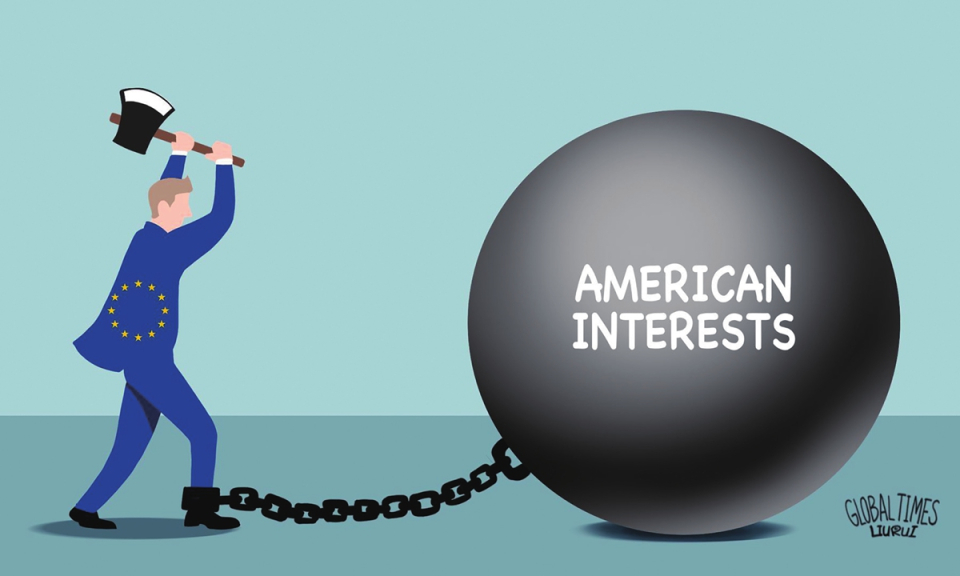By James Smith
The US is pursuing a global campaign to try and contain the rise of China. To do so, the Joe Biden administration has sought to enlist allies and has significantly pushed for transatlantic cooperation. Because of the war in Ukraine, Washington has been able to place growing pressure on European countries to enlist in anti-China goals, particularly through institutions such as NATO.
While such requests have been relatively easy for vassal states such as the UK to follow the US' demands, as a whole the countries of the EU have been more hesitant in signing up to Washington's agenda, even as certain institutional leaders as such as European Commission President Ursula Von Der Leyden increasingly parrot such rhetoric. Perhaps clearer among American goals is the demand that Europe also follows the US in "strategic decoupling" against China and reinforcing its ever growing embargo of high end technologies to the country.
Should Europe follow suit with such decoupling? And is it in the European interest to do so? The answer could not be more clear than European leaders themselves, with German Chancellor Olaf Scholz having made a publicized visit to Beijing in November, who was soon followed by President of the European Council Charles Michel. The messages of both of these leaders were identical, and very clear, that the "decoupling" pushed by the US, and the forced revision of the international order into a Cold War style confrontation, is not in the interests of Europe.
But the US does not show much interest in listening. Recent news articles detail its attempt to coerce the Netherland's world class and leading Lithography firm, ASML, to follow US rules and ban the export of machines which make chips under 14nm nodes to China, to make recent sanctions it imposed ironclad. The firm's executives have always been very outspoken about this coercive behaviour from the US, pointing out that China is one of their largest markets and such sanctions will not only deprive the company of that, but also accelerate China's resolve to develop the technology themselves and impose long-term damage on the company.
But this is only one small aspect as to how the push for "decoupling", or what we might call "strategic centralization" is hurting Europe. The current foreign policy strategy of the US has grown to reject globalization as it now believes it creates an international environment of which dilutes and undermines American power by strengthening "competitor" states. As such, one of American key foreign policy goals, which began with Donald Trump, has been to instigate geopolitical conflict to recentralize US power over its allies and force them to decouple from economic engagement with these states, in particular, Russia and China, aiming to fill the gap with itself.

Concerning the Ukraine war, the US has pushed European countries to end their energy relationships with Russia, instead selling them its own liquid natural gas products at much higher prices, while also ensuring its Military-Industrial complex profits from the growing arms sales and security realignment. But more so has been the fact that surging energy prices throughout the continent has taken a grave toll against industrial productivity and led to a phenomenon which many commentators have described as "de-industrialization," that is the erosion of Europe's own business and industrial capacity by promoting the US as a more beneficial destination.
Several acts of the US congress recent passed, such as the Inflation Reduction Act, have made this trend worse by initiating in large scale protectionist subsidies which further hurt European competitiveness. The Biden administration has long stated that its goal is to realign strategic supply chains into the US, as it is doing with semiconductors, and this comes at the logical expense of allies being "hollowed out". As another example, outside of Europe, what will the massive US investment in domestic chip capacity do to chip-making hubs such as Taiwan island, South Korea and Japan? This is what "decoupling" looks like, and allied states are set to be the biggest losers of this policy because it is initiating an "America First" economic order.
Given this, allied countries should think twice about following the foreign policies of the US when it comes to so-called decoupling, especially in the case of Europe. The US does not see the continent as an equal partner in the sense of a multipolar world, but sees only a US led unipolar world whereby Europe is a follower, a passenger and a subordinate. The Biden administration's policies throughout this year have been damaging to European security, growth and prosperity across the board, threatening the very concept the EU professes to hold known as "strategic autonomy." A change of course is needed.
Source: Global Times
















